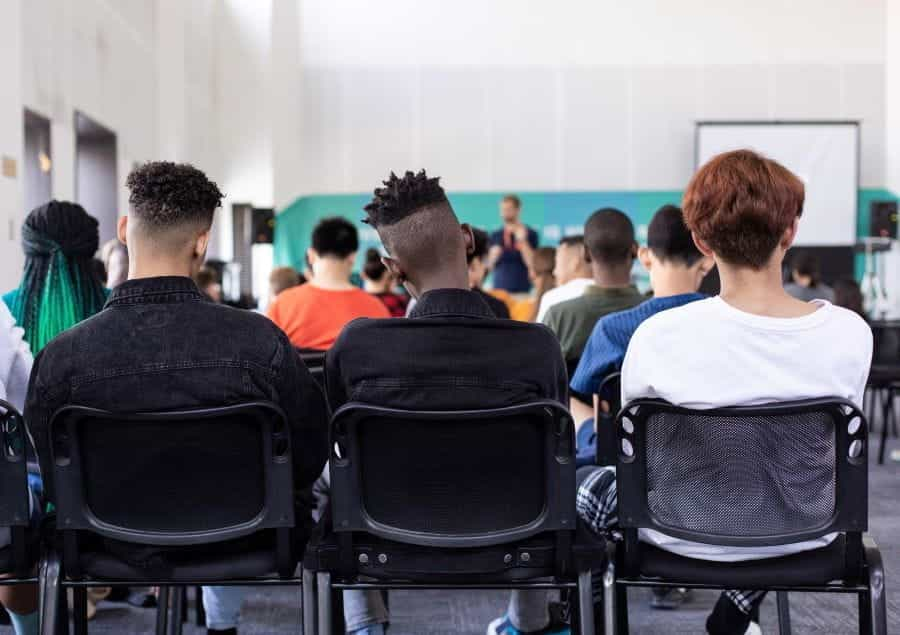GambleAware Highlights Gap in Access to Treatment
According to new figures from GambleAware, 46% of people suffering from a gambling disorder have not accessed treatment or support. The new findings are the product of in-depth research into demand for gambling harm treatments. The charity has highlighted the need for more flexible treatment and support to help individuals in all communities struggling with problem gambling.

GambleAware’s new findings highlight the need for new and improved education programs, such as the latest one launched by the BGC. ©Sam Balye/Unsplash
Half of Problem Gamblers Don’t Access Treatment
GambleAware’s statistic was published in a new survey, the Treatment Needs and Gap Analysis report. It found that one in two problem gamblers in the UK have not received treatment or support. The research is the first of it’s kind and carried out by a group of researchers, including the National Centre for Social Research.
According to the report, a number of barriers have inhibited access to treatment and support, such as stigma, lack of awareness and reluctance to admit to problem gambling. 27% of problem gamblers said that they had experienced stigma or shame, while 17% of problem gamblers said that their gambling was not harmful.
The report also says that some communities are less likely to have their needs adequately met for treatment and support. Women, BAME communities and those from lower socioeconomic backgrounds were all found to be in need of more flexible options.
Included in the research is a population level survey from YouGov, highlighting that around 54% to 61% of people in the UK have gambled during the last year. 2.7% scored a PGSI of 8+, the level at which one is categorized as a problem gambler. Problem gamblers experience loss of control and suffer from negative consequences as a result of their gambling.
However, Professor Patrick Sturgis, who independently assessed the YouGov survey, placed the prevalence of gambling harms at a lower level. According to Sturgis, it is likely to be closer to the Combined Health Survey’s figure of 0.7% of the population, rather than YouGov’s 2.7%.
In response to the findings, GambleAware has highlighted the need for improvement in the current treatment and support systems on offer to problem gamblers. This includes providing more flexible options and combating barriers which prevent access to help. Gender and demographic factors should also be taken into account.
“Working with those with lived experiences is essential in designing and promoting access to services, as well as helping to prevent relapse. It is important to engage community institutions including faith groups, to help make more people aware of the options available to them and ensure no one feels excluded from services.”– Marc Etches, Chief Executive, GambleAware
Dr Sokratis Dinos, Research Director at the National Centre for Social Research added that “a recurrent theme across this program of studies was related to a lack of awareness of, or hesitation to accept, that gambling behaviour may be harmful”. Improving education programs and public messaging is therefore necessary to reduce social stigma and encourage those in need of support and treatment to access it.
BGC Launches £10 Million Gambling Education Program
Meanwhile the Betting and Gaming Council has launched a £10 million national gambling education and support program for British schools. GamCare and YGAM, two charities that offer support for those affected by problem gambling, will deliver the independent education program. The aim is that all 11 to 19 year olds will receive education on gambling awareness.
“As the new standards body representing most of the regulated industry, the BGC is delighted to be supporting this fantastic initiative. Educating our young people is vital if we are to ensure that they are better informed and fully aware of the potential risks. It’s also essential that those who are teaching them are fully trained and able to look out for the tell-tale signs of any gambling-related harm and how to access help if required.”– Michael Dugher, Chief Executive, Betting and Gaming Council
Members of the Betting and Gaming Council, which represents approximately 90% of the UK’s gambling industry, will provide funding for the education program. The program is designed to enable a generation of young people to understand the risks associated with gambling and to learn how to “engage with gambling products and environments in an informed way”.
The new program comes as part of the BGC’s Safer Gambling Commitments, a series of pledges made when it launched in November 2019. YGAM and GamCare will provide education to 120,000 young people, as well as training for more than 100,000 professionals, including teachers, youth workers and community mental health practitioners.
Some details of the program have already been set out by the two charities. The program will provide a minimum of one session of gambling awareness education to all 11 to 19 year olds during their secondary education. Those working with young people should be offered information about gambling risks, as well as taught how to recognize when young people are affected by gambling harms and where help can be found.
Parents and families should also be given access to information and guidance on how to keep young people safe from gambling harms. Those who are below the age of 18 will be offered age-appropriate treatment if they or someone they know is affected by problem gambling. The education program is evidence-led and aims to equip people with skills to identify and discuss gambling harms.
Anna Hemmings, GamCare’s CEO, explained why the new program is needed now more than ever. “What we see in the classroom tends to be polarised views on gambling, and a lack of clear understanding about its potential risks. She went on to explain that educating young people about gambling risks should be on a par with teachings around other risky behaviors, and that the new program would help to bridge that gap.
Lee Willows, the founder and CEO of YGAM, was equally excited at the launch of the new program and its collaboration with GamCare and the BGC. For the last five years YGAM has offered training to professionals who work with young people. The charity’s purpose is to “inform, educate, safeguard and build digital resilience amongst young and vulnerable people”.
“Raising awareness and harm-prevention education is an important component to reduce gambling-related harms. By training professionals who have influence over young people’s learning, we will equip these professionals with the skills, knowledge and confidence to not only deliver the program but also highlight the age-appropriate support available from GamCare.”
In March, the Department for Education also announced that new lessons teaching pupils about the risks of gambling and debt would be introduced to the curriculum this coming September.



